15 Tips for Writing, Proofreading, and Editing Your College Essay
What’s Covered:
- Our Checklist for Writing, Proofreading, and Editing Your Essay
- Where to Get Your College Essays Edited
Your college essay is more than just a writing assignment—it’s your biggest opportunity to showcase the person behind your GPA, test scores, and extracurricular activities. In many ways, it’s the best chance you have to present yourself as a living, breathing, and thoughtful individual to the admissions committee.
Unlike test scores, which can feel impersonal, a well-crafted essay brings color to your application, offering a glimpse into your passions, personality, and potential. Whether you’re an aspiring engineer or an artist, your college essay can set you apart, making it essential that you give it your best.
Our Checklist for Writing, Proofreading, and Editing Your Essay
1. Does the essay address the selected topic or prompt?
Focus on responding directly and thoughtfully to the prompt. If the question asks about your reasons for choosing a specific program or your future aspirations, ensure that your essay revolves around these themes. Tailor your narrative to the prompt, using personal experiences and reflections that reinforce your points.
- Respond directly to the prompt: It’s imperative that you thoughtfully craft your responses so that the exact themes in the prompt are directly addressed. Each essay has a specific prompt that serves a specific purpose, and your response should be tailored in a way that meets that objective.
- Focus: Regardless of what the prompt is about—be it personal experiences, academic achievements, or an opinion on an issue—you must keep the focus of the response on the topic of the prompt.
2. Is the college essay well organized?
An essay with a clear structure is easier to follow and is more impactful. Consider organizing your story chronologically, or use a thematic approach to convey your message. Each paragraph should transition smoothly to the next, maintaining a natural flow of ideas.
A well-organized essay is not only easier for the reader to follow, but it can also aid your narrative flow. Logically structured essays can guide the reader through complex and hectic sequences of events in your essay. There are some key factors involved in good structuring:
- A strong hook: Start with a sentence or a paragraph that can grab the attention of the reader. For example, consider using a vivid description of an event to do this.
- Maintain a thematic structure: Maintaining a thematic structure involves organizing your response around a central theme, allowing you to connect diverse points of your essay into a cohesive centralized response.
- Transitioning: Each paragraph should clearly flow into the next, maintaining continuity and coherence in narrative.
3. Include supporting details, examples, and anecdotes.
Enhance your narrative with specific details, vivid examples, and engaging anecdotes. This approach brings your story to life, making it more compelling and relatable. It helps the reader visualize your experiences and understand your perspectives.
4. Show your voice and personality.
Does your personality come through? Does your essay sound like you? Since this is a reflection of you, your essay needs to show who you are.
For example, avoid using vocabulary you wouldn’t normally use—such as “utilize” in place of “use”—because you may come off as phony or disingenuous, and that won’t impress colleges.
5. Does your essay show that you’re a good candidate for admission?
Your essay should demonstrate not only your academic strengths. but also the ways in which your personal qualities align with the specific character and values of the school you’re applying to. While attributes like intelligence and collaboration are universally valued, tailor your essay to reflect aspects that are uniquely esteemed at each particular institution.
For instance, if you’re applying to Dartmouth, you might emphasize your appreciation for, and alignment with, the school’s strong sense of tradition and community. This approach shows a deeper understanding of and a genuine connection to the school, beyond its surface-level attributes.
6. Do you stick to the topic?
Your essay should focus on the topic at hand, weaving your insights, experiences, and perspectives into a cohesive narrative, rather than a disjointed list of thoughts or accomplishments. It’s important to avoid straying into irrelevant details that don’t support your main theme. Instead of simply listing achievements or experiences, integrate them into a narrative that highlights your development, insights, or learning journey.
Example with tangent:
“My interest in performing arts began when I was five. That was also the year I lost my first tooth, which set off a whole year of ‘firsts.’ My first play was The Sound of Music.”
Revised example:
“My interest in performing arts began when I was five, marked by my debut performance in ‘The Sound of Music.’ This experience was the first step in my journey of exploring and loving the stage.”
7. Align your response with the prompt.
Before finalizing your essay, revisit the prompt. Have you addressed all aspects of the question? Make sure your essay aligns with the prompt’s requirements, both in content and spirit. Familiarize yourself with common college essay archetypes, such as the Extracurricular Essay, Diversity Essay, Community Essay, “Why This Major” Essay (and a variant for those who are undecided), and “Why This College” Essay. We have specific guides for each, offering tailored advice and examples:
- Extracurricular Essay Guide
- Diversity Essay Guide
- Community Essay Guide
- “Why This Major” Essay Guide
- “Why This College” Essay Guide
- Overcoming Challenges Essay Guide
- Political/Global Issues Essay Guide
While these guides provide a framework for each archetype, respectively, remember to infuse your voice and unique experiences into your essay to stand out!
8. Do you vary your sentence structure?
Varying sentence structure, including the length of sentences, is crucial to keep your writing dynamic and engaging. A mix of short, punchy sentences and longer, more descriptive ones can create a rhythm that makes your essay more enjoyable to read. This variation helps maintain the reader’s interest and allows for more nuanced expression.
Original example with monotonous structure:
“I had been waiting for the right time to broach the topic of her health problem, which had been weighing on my mind heavily ever since I first heard about it. I had gone through something similar, and I thought sharing my experience might help.”
Revised example illustrating varied structure:
“I waited for the right moment to discuss her health. The issue had occupied my thoughts for weeks. Having faced similar challenges, I felt that sharing my experience might offer her some comfort.”
In this revised example, the sentences vary in length and structure, moving from shorter, more impactful statements to longer, more descriptive ones. This variation helps to keep the reader’s attention and allows for a more engaging narrative flow.
9. Revisit your essay after a break.
- Give yourself time: After completing a draft of your essay, step away from it for a day or two. This break can clear your mind and reduce your attachment to specific phrases or ideas.
- Fresh perspective: When you come back to your essay, you’ll likely find that you can view your work with fresh eyes. This distance can help you spot inconsistencies, unclear passages, or stylistic issues that you might have missed earlier.
- Enhanced objectivity: Distance not only aids in identifying grammatical errors or typos, but it also allows you to assess the effectiveness of your argument or narrative more objectively. Does the essay really convey what you intended? Are there better examples or stronger pieces of evidence you could use?
- Refine and polish: Use this opportunity to fine-tune your language, adjust the flow, and ensure that your essay truly reflects your voice and message.
Incorporating this tip into your writing process can significantly improve the quality and effectiveness of your college essay.
10. Choose an ideal writing environment.
By identifying and consistently utilizing an ideal writing environment, you can enhance both the enjoyment and effectiveness of your essay-writing process.
- Discover your productive spaces: Different environments can dramatically affect your ability to think and write effectively. Some people find inspiration in the quiet of a library or their room, while others thrive in the lively atmosphere of a coffee shop or park.
- Experiment with settings: If you’re unsure what works best for you, try writing in various places. Notice how each setting affects your concentration, creativity, and mood.
- Consider comfort and distractions: Make sure your chosen spot is comfortable enough for long writing sessions, but also free from distracting elements that could hinder your focus.
- Time of day matters: Pay attention to the time of day when you’re most productive. Some write best in the early morning’s tranquility, while others find their creative peak during nighttime hours.
11. Are all words spelled correctly?
While spell checkers are a helpful tool, they aren’t infallible. It’s crucial to read over your essay meticulously, possibly even aloud, to catch any spelling errors. Reading aloud can help you notice mistakes that your eyes might skip over when reading silently. Be particularly attentive to words that spellcheck might not catch, such as proper nouns, technical jargon, or homophones (e.g., “there” vs. “their”). Attention to detail in spelling reflects your care and precision, both of which are qualities that admissions committees value.
12. Do you use proper punctuation and capitalization?
Correct punctuation and capitalization are key to conveying your message clearly and professionally. A common mistake in writing is the misuse of commas, particularly in complex sentences.
Example of a misused comma:
Incorrect: “I had an epiphany, I was using commas incorrectly.”
In this example, the comma is used incorrectly to join two independent clauses. This is known as a comma splice. It creates a run-on sentence, which can confuse the reader and disrupt the flow of your writing.
Corrected versions:
Correct: “I had an epiphany: I was using commas incorrectly.”
Correct: “I had an epiphany; I was using commas incorrectly.”
Correct: “I had an epiphany—I was using commas incorrectly.”
Correct: “I had an epiphany. I was using commas incorrectly.”
The corrections separate the two clauses with more appropriate punctuation. Colons, semicolons, em dashes, and periods can all be used in this context, though periods may create awkwardly short sentences.
These punctuation choices are appropriate because the second clause explains or provides an example of the first, creating a clear and effective sentence structure. The correct use of punctuation helps maintain the clarity and coherence of your writing, ensuring that your ideas are communicated effectively.
13. Do you abide by the word count?
Staying within the word count is crucial in demonstrating your ability to communicate ideas concisely and effectively. Here are some strategies to help reduce your word count if you find yourself going over the prescribed limits:
- Eliminate repetitive statements: Avoid saying the same thing in different ways. Focus on presenting each idea clearly and concisely.
- Use adjectives judiciously: While descriptive words can add detail, using too many can make your writing feel cluttered and overwrought. Choose adjectives that add real value.
- Remove unnecessary details: If a detail doesn’t support or enhance your main point, consider cutting it. Focus on what’s essential to your narrative or argument.
- Shorten long sentences: Long, run-on sentences can be hard to follow and often contain unnecessary words. Reading your essay aloud can help you identify sentences that are too lengthy or cumbersome. If you’re out of breath before finishing a sentence, it’s likely too long.
- Ensure each sentence adds something new: Every sentence should provide new information or insight. Avoid filler or redundant sentences that don’t contribute to your overall message.
14. Proofread meticulously.
Implementing a thorough and methodical proofreading process can significantly elevate the quality of your essay, ensuring that it’s free of errors and flows smoothly.
- Detailed review: After addressing bigger structural and content issues, focus on proofreading for grammar, spelling, and punctuation errors. This step is crucial for polishing your essay and making sure it’s presented professionally.
- Different techniques: Employ various techniques to catch mistakes. For example, read your essay backward, starting from the last sentence and working your way to the beginning. This method can help you focus on individual sentences and words, rather than getting caught up in the content.
- Read aloud: As mentioned before, reading your essay aloud is another effective technique. Hearing the words can help identify awkward phrasing, run-on sentences, and other issues that might not be as obvious when reading silently.
15. Utilize external feedback.
While self-editing is crucial, external feedback can provide new perspectives and ideas that enhance your writing in unexpected ways. This collaborative process can help you keep your essay error-free and can also help make it resonate with a broader audience.
- Fresh perspectives: Have a trusted teacher, mentor, peer, or family member review your drafts. Each person can offer unique insights and perspectives on your essay’s content, structure, and style.
- Identify blind spots: We often become too close to our writing to see its flaws or areas that might be unclear to others. External reviewers can help identify these blind spots.
- Constructive criticism: Encourage your reviewers to provide honest, constructive feedback. While it’s important to stay true to your voice and story, be open to suggestions that could strengthen your essay.
- Diverse viewpoints: Different people will focus on different aspects of your writing. For example, a teacher might concentrate on your essay’s structure and academic tone, while a peer might provide insights into how engaging and relatable your narrative is.
- Incorporate feedback judiciously: Use the feedback to refine your essay, but remember that the final decision on any changes rests with you. It’s your story and your voice that ultimately need to come through clearly.
Where to Get Your College Essays Edited
Do you want free, nearly-instantaneous feedback on your college essays? After rereading your essays countless times, it can be difficult to evaluate your writing objectively. So meet Sage, our AI tutor and advisor, who will rate your essay, give you suggestions for improvement, and summarize what admissions officers would take away from your writing. Sage can improve your chances of acceptance to your dream school by helping you show what you have to offer beyond the numbers!


